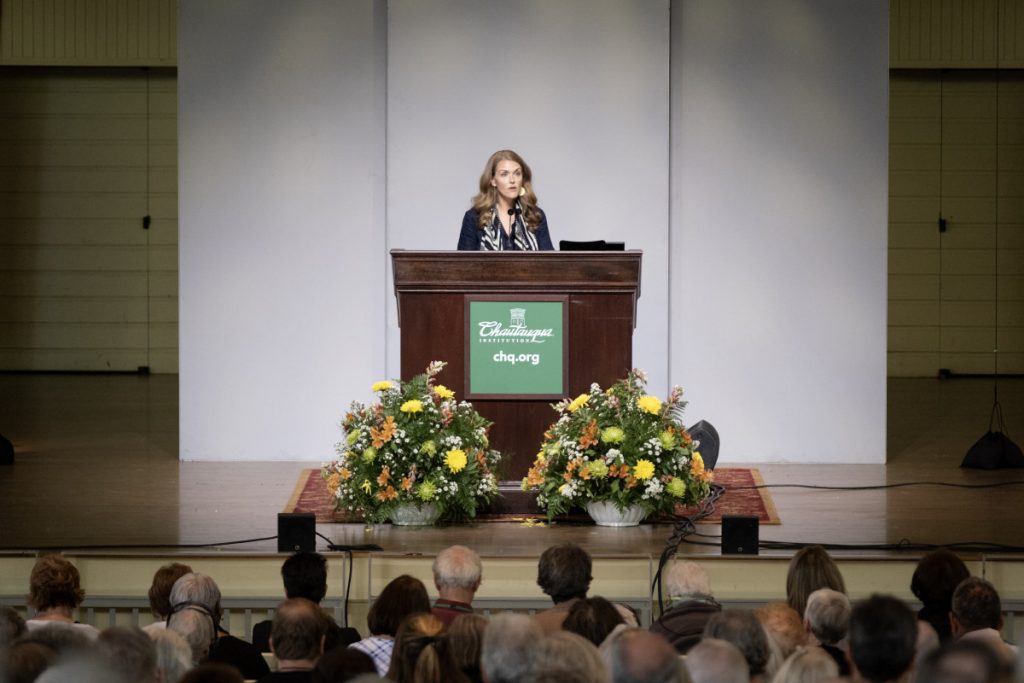
Alton Northup
Staff writer
Jennifer Frey wants a return to traditional liberal education, and she plans to use classic literature to get there.
“The study of classic texts has the potential to make us free to pursue the highest goods and meet the highest aspirations of a human person,” she said. “It’s a freedom to flourish.”
Frey, a philosopher and the inaugural dean of the Honors College at the University of Tulsa, said a liberal education should focus on developing wisdom and virtue. She discussed the role of classic literature in this capacity in her lecture, “Why Read Classic Texts Today?” at 10:45 a.m. Tuesday in the Amphitheater to continue the Chautauqua Lecture Series Week Six theme, “A Life of Literature.”
Frey said she worries universities are focusing too much on creating experts and high-salaried workers, but not enough on creating people who can live free and meaningful lives.
“Education is formation; it’s not simply skill or knowledge,” she said.
The three common goods of a liberal education are wisdom, virtue and friendship, she said. Wisdom is the opposite of expertise. Instead of mastering one area, it transcends disciplinary boundaries and seeks to connect all knowledge into a cohesive whole.
As enrollment in traditional liberal arts programs shrinks across the country, she said philosophy students feel out of place on campuses because they have needs they do not know how to articulate. Universities and colleges must help them in their search for truth.
As dean of Tulsa’s Honors College, a position she holds as of last month after working as an associate professor of philosophy and the Peter and Bonnie McCausland Faculty Fellow at the University of South Carolina, Frey plans to do this through study of the classics.
“Our conviction at the Honors College is that the study of classic texts, which involves serious training in the art of dialectic, is the best path toward the promotion of these goods in a university setting,” she said.
However, students cannot arrive at these goods without first learning virtues of mind and character. Frey finds humility, the most important of these virtues, in Plato’s depiction of Socrates. Credited as the founder of Western philosophy, Socrates’ humility defines him.
“Socrates’ wisdom … was best encapsulated in his profession of ignorance,” she said. “He never claimed to know or understand the things that he was always inquiring about.”
In Plato’s The Symposium, he introduces the concept of the ladder of love. The highest rung on the ladder is wisdom, which Frey said blindness, self-centeredness and needy egos prevent people from reaching. The very first step is acknowledging a lack of proper education.
“If our students are not humble, if we are not humble … we cannot hope for wisdom,” Frey said.
This includes humility regarding the past. Many young people assume that the current generation is enlightened, and previous generations were ignorant, she said. Frey pointed out that in 100 years, young people may still think the same thing.
She argued that a healthy and correct engagement with the past cultivates humility. Looking back, the great leaders of past generations were all “mixed bags.” They had their virtues and vices, strengths and weaknesses, visions and blind spots – they were human.
“We cannot critique them in a deep and interesting way if we do not first understand them, and we cannot understand them except through a historical lens,” she said. “Tradition is not a dead letter, but an active work.”
Having a history is what makes humanity distinct from other species, Frey said. It should not be rejected or destroyed, but judged and corrected. Doing otherwise, she said, deprives people of their humanity.
Fortitude is another virtue necessary for wisdom, Frey said.
“This is not just a matter of reading the situation clearly, but of actually having the strength of spirit to suffer for what one believes is true or good or beautiful,” she said.
Plato argued for telling the truth to the point of death. Apology of Socrates, a Socratic dialogue by Plato, details Socrates’ trial in Athens for atheism and corruption of youth. Rather than apologize, he attempted to engage the jury in philosophical dialectics, the art of discussing the truth. Unable to sway the jury, he died a martyr for philosophy.
“It’s difficult to live in reality, to be committed to the truth, when it neither flatters nor comforts you,” Frey said.
In Gustave Flaubert’s 1856 novel Madame Bovary, the titular character struggles to live in reality after internalizing fictional tropes.
“This classic text suggests it matters a great deal what you are consuming,” Frey said. “Reading well and living well are perhaps bound up together in interesting ways.”
But reading well is only worth it when a person can bring virtues and liberal learning together to understand the text. As a group, asking dialectical questions – ones that seek the truth through reasoned argumentation – can do that.
“To study classic texts is to enter conversation with the great thinkers of the past, but to do it together with others who are also trying to learn,” she said. “If we share wisdom as a common end and purpose, then we will want to help one another along the way.”




